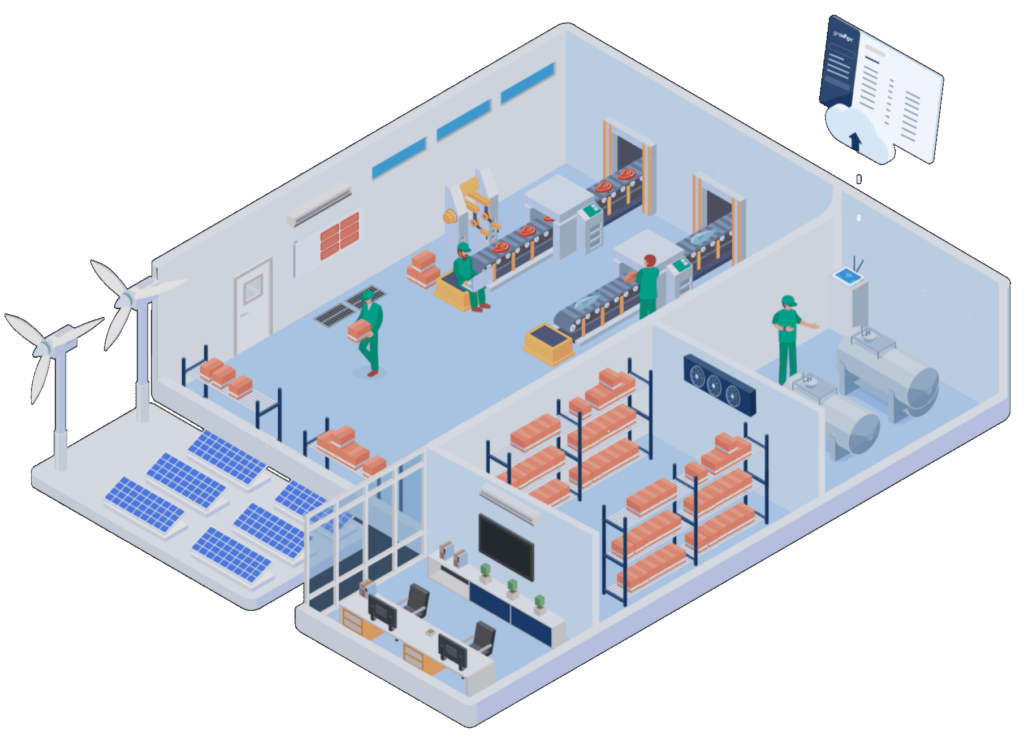Gradhoc
Business growth: Challenges as a CEO of a Food Industry
Smart refrigeration, cooler future
Gradhoc
Challenges in business growth within the Food Industry
As a CEO in the food industry, one of the most critical priorities is ensuring the efficiency and sustainability of our operations without compromising quality or food safety. However, the journey is not without challenges that directly impact multiple key areas of the organization, from quality, maintenance, and production to finance, technology, sustainability, and innovation.
These challenges not only highlight the complexity of managing a dynamic and highly regulated sector but also the urgent need to transition toward more integrated, traceable, and future-oriented systems. Addressing these issues is not optional; it is a strategic imperative to remain competitive in an increasingly demanding global environment while driving sustainable business growth.
Industrial refrigeration operations play a pivotal role in maintaining this balance. An advanced management of industrial refrigeration, through the use of cutting-edge software, not only enhances the monitoring of the cold chain but also positively impacts various departments within the company. By addressing inefficiencies and optimizing processes, businesses can align their sustainability goals with opportunities for business growth. This approach provides effective solutions to the specific challenges faced by each area. Below, we outline the key challenges that can be addressed across different operational sectors.

Barriers to Business Growth | Maintenance | Quality | Sustainability | IT | Production | Finance | R&D |
|---|---|---|---|---|---|---|---|
Reactive system management: reliance on corrective maintenance. | |||||||
Excessive on-site manual interventions. | |||||||
Reduced equipment and machinery lifespan. | |||||||
High costs: energy and maintenance expenses. | |||||||
Challenges in ensuring food safety. | |||||||
Difficulties in documenting HACCP (Hazard Analysis and Critical Control Points). | |||||||
Regulatory compliance: food safety, energy reduction, and food waste minimization. | |||||||
Product losses and food waste. | |||||||
Production downtime. | |||||||
Difficulty in achieving product temperature traceability. | |||||||
Data management issues: absence of data or inconsistent data streams. | |||||||
Heterogeneous information from different manufacturers and sources. | |||||||
Deployment of monolithic solutions with limited integration capability. | |||||||
Disaggregated information across various refrigeration subsystems. | |||||||
Specialized maintenance requiring dedicated personnel. | |||||||
Excessive personnel involvement in operational tasks. | |||||||
Employee stress: unplanned tasks, emergencies, or production halts. | |||||||
Legacy technologies with limited traceability in processes. |
Gradhoc
With Gradhoc you overcome these challenges
Gradhoc provides a range of benefits designed to help you tackle both current and future challenges.
Gradhoc is a cloud-based software solution tailored for the agri-food industry, designed to optimize refrigeration processes and ensure the smooth operation of critical facilities. For CEOs in the food industry, this system is a powerful tool to ensure operational continuity, minimize downtime, and enhance energy efficiency.
By integrating technologies like IoT, AI, and digital twins, Gradhoc continuously monitors refrigeration systems, predicts potential failures, and automatically takes corrective actions before issues arise. This proactive approach significantly reduces maintenance costs, increases the lifespan of refrigeration equipment, and ensures the quality and safety of your products.
Additionally, Gradhoc offers real-time monitoring and advanced energy management features, enabling companies to cut energy costs, comply with environmental regulations, and reduce their carbon footprint. The software’s predictive maintenance and optimization capabilities not only prevent failures but also enhance operational efficiency, helping your business growth while keeping costs under control.
The adoption of Gradhoc also supports long-term business growth by enabling greater scalability and adaptability in your operations, ensuring that your company remains competitive in a rapidly evolving industry.
In a sector where food safety and operational efficiency are paramount, Gradhoc offers peace of mind by ensuring your refrigeration systems perform at their best, now and in the future.
Gradhoc
The Role of Technology in Driving Business Growth
As a CEO, one of the most critical aspects of running a company is ensuring sustained business growth. This growth is not simply about increasing profits, but also about scaling operations, expanding market reach, and improving efficiency across the organization. In today’s rapidly evolving landscape, technology plays a pivotal role in driving these outcomes. Business growth strategies that leverage the latest technological advancements can help streamline processes, enhance decision-making, and provide valuable insights into customer behavior.
However, managing business growth requires addressing various challenges. The challenges of a CEO often include balancing innovation with operational stability, securing the right talent, and managing the complexities of a global marketplace. Technology has become indispensable in overcoming these hurdles, offering solutions that improve collaboration, optimize resource allocation, and foster agility in an increasingly competitive environment.
By aligning technology with business growth strategies, CEOs can position their companies for long-term success. As a result, understanding how to integrate and leverage new technologies will remain a top priority for leaders who are committed to sustainable growth and navigating the future of their industries.
Gradhoc
Will you prepare for change?
Fill out the form to request a demo or a quote